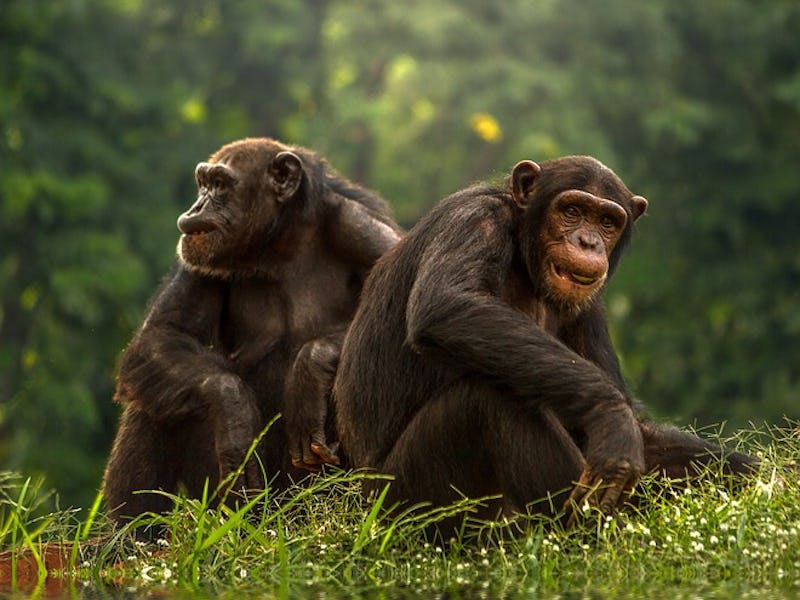Roots of Human Generosity Revealed by Surprisingly Unselfish Apes
When's the last time you gave up the last slice?

A fascinating new study shows that bonobos, some of our closest primate relatives, happily share food with others. The report, published in the Proceedings of the Royal Society B, challenges scientists’ understanding of our own propensity for sharing things, from meals to memes.
“There are huge debates among researchers about the evolutionary origins of human cooperation,” lead study author Christopher Krupenye, Ph.D., an evolutionary anthropologist at the University of St. Andrews in Scotland, told Discover Magazine. Many believe that generosity is a uniquely human trait that arose because of the need to share resources, such as meat from a hunt or stone tools for cutting through animal skins, but there is increasing evidence that humans are simply not all that special.
Turns out humans aren't the only apes that share.
Scientists have found that bonobos, and their cousins the chimpanzees, have several personality and behavioral traits in common with humans. Both chimps and bonobos are able to communicate with each other using gestures. They also use tools such as sticks, rocks, and antlers to dig or crack open food. In May, researchers showed that bonobos and chimps also have several muscles that are very similar to the ones thought to have helped humans evolve their “unique” bipedalism, sophisticated vocal cords, and facial expressions.
In the past, scientists have documented some instances of “sharing” among chimpanzees and bonobos too, but most of this involved merely tolerating other individuals taking food or giving in to relentless harassment by others in one’s group. “It’s exceedingly rare for primates to actively hand monopolizable food to others,” Krupenye said.
Chimps, meanwhile, will not let you have the last slice of pizza.
To test whether bonobos would willingly hand over food and other items, Krupenye and his team singled out 18 bonobos and gave them sticks. Then, the researchers motioned to the out-of-reach stick and asked the bonobo to help pass it to a human experimenter. In a second experiment, the scientists paired bonobos in cages next to each other so they could interact through a mesh window and a hole. This time, the researchers gave one bonobo some rocks and the other a handful of palm nuts — a snack they like to crack open using stones.
Bonobos showed very little motivation to hand over the sticks to researchers, or the stones to their partners. But when it came to food, the animals consistently shared the nuts, even though they could have kept the snacks all to themselves.
Their generosity was striking, especially when compared to another one of our close primate relatives: chimpanzees. “Chimps are really reluctant to give food away,” Felix Warneken, Ph.D., a University of Michigan psychologist, told the New York Times.
The difference may be due to the environments in which each species evolved, Warneken said. While chimpanzees and bonobos shared a common ancestor two million years ago, chimps evolved in habitats where they had to compete for food. Bonobos, on the other hand, likely had more abundant resources, which increases the motivation to share with others.
But scientists are not sure whether it’s just a difference of environments that affects how much chimps, bonobos and humans share, or if it is something that is genetically hardwired. Either way, it’s clear that we’re tightly linked to our hairy, partially-bipedal kin, whether we like it or not.
To learn more about the link between us and our more selfish kin, check out the video below: